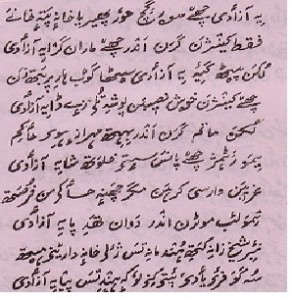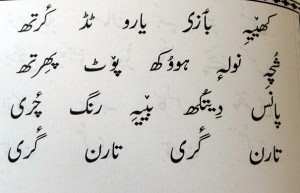Peace Watch » Editor's Take » Satire and Resistence
Satire and Resistence
Satire and Resistance
Presentation
By
Zahid G Muhammad on Zareef Ahmed Zareef’s book Taran Garee on 28-5- 2012 in Kashmir University
Mr. Chairman, Justice B. A. Kiramani and fellow panelist and friends in the hall.
Very good afternoon to all.
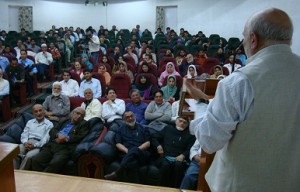 I thank Zareef Ahmed Zareef and Riyaz Rufai Librarian of Allama Iqbal Library for providing me an opportunity to share my views on Zareef Sahib poetical collection Tarangaree.
I thank Zareef Ahmed Zareef and Riyaz Rufai Librarian of Allama Iqbal Library for providing me an opportunity to share my views on Zareef Sahib poetical collection Tarangaree.
I am not an authority on Kashmir literature. A galaxy of them is present in this hall. In presence of these veterans of Kashmiri language and literature, I feel Lilliputian.
Having being asked to review a poetic collection by one of famed poets, Zareef Sahib, I am caught up in a threatening situation with Ezra pounds and Eliot’s of Kashmir language sitting on the panel and in front rows of the hall.
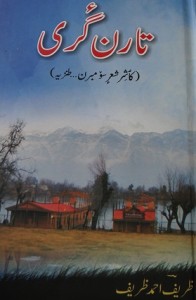 I strongly feel, perhaps I am not the right person to comment on his latest satirical work. However, for my personal admiration for the poet, his steadfastness, uprightness and bleeding heart for his fellow brethren I took the risk and accepted the offer of making a presentation on this valuable contribution. This work has added one more shade to our beautiful literary landscape. My presentation would be more an expression of gratitude for his voicing concern over the agonized life of people rather than a critical appreciation or a review in strict sense. It is not easy to tell the truth- the bitter truth in situation that has been beautifully summed up by Rahi Sahib in this verse:
I strongly feel, perhaps I am not the right person to comment on his latest satirical work. However, for my personal admiration for the poet, his steadfastness, uprightness and bleeding heart for his fellow brethren I took the risk and accepted the offer of making a presentation on this valuable contribution. This work has added one more shade to our beautiful literary landscape. My presentation would be more an expression of gratitude for his voicing concern over the agonized life of people rather than a critical appreciation or a review in strict sense. It is not easy to tell the truth- the bitter truth in situation that has been beautifully summed up by Rahi Sahib in this verse:
It truly needs share courage to wear one’s heart on one’s sleeves in situation as that of ours- where thoughts and expression are captives.
Zareef Ahmed has now been adorning our literary landscape for past five decades. He is an accomplished essayist and a poet. He has been versifying in all forms of poetry, Ghazals, Nazamazs, quadrants and satire. Satire is his forte- it has made him what I would love to call as people’s poet- a poet who has endeared him to the people of the state. What makes him as distinctive from some of his other contemporaries is that he avoids literary jargons and refuses to swim with the tide. He has a direct style as he rightly says about his writings:
“ I have so far been preventing my poetry from ambiguities and unnecessary literary complexities that some men of letters have made fashionable. And have become order of the day. The purpose of my writing is to provide relief to my parched beautiful land and to provide comfort and solace to my tormented brethren. And to wake them up and make them realize that they are not inanimate but full of life.”
His prose as well as poetry touches your heart. Like an ace archer, he shoots from his bow words that straight way pierce hearts – and stirs the minds. Tarangree is his first poetic collection. In 2008, he released his Essay compilation Khabar Tougma Wanun. It was well received in the literary circles. It is good contribution to the scant Kashmiri prose. True, he has been writing in all literary forms but satire is his forte- whether it is his prose or poetry. ‘Since antiquity satire has been recognized as an important art form. It has been popular with several Greek playwrights.
I would love to call satire as literature with purpose and satirist ‘serves as harbinger of errors in societies.’ The role of satirist in the words of Jonathan Swift is “to mend the World as far as they are able,” ‘correct vices and reinstate virtues. Literature is brimful with works of great satirist that forced their societies to introspect and to look into fads, fancies, follies and foibles. “Take Jonathan Swift’s “A Model Proposal,” or Mark Twain’s “Huck Finn.” These two works unrepentantly illuminate the ills of their respective societies. I cannot imagine a news report more powerful than those finely crafted works of satire. It is the honesty and humanism of satire that make it so valuable, in that it forces the reader/viewer to reflect upon his own shortcomings.”
Patriotic and satirical poetry has had role in nation’s freedom struggles. Notwithstanding satire usually being witty, it has generated powerful literary movements against brutal rulers and colonizers. Through cleverly crafted criticism satirist have infused spirit of freedom in people and geared them up by drawing caricatures of tormentors.
In our situation, I see a great role played by troubadours. The institution of troubadour might have been there for centuries as late it was fifties it had emerged as a well-established institution of political satire. In a situation, when press was muzzled, people were gagged, intimidation and terror had become second nature of men in power and fascism was manifest in its ugliest form troubadour through his satire strengthened peoples belief. It is not only the minstrels’ and troubadour that through the impromptu satirical poetry have been castigating the alien rulers, their cohorts and collaborators but even great poets through their satire have criticized their rulers. Literary history our land is full of poets that have lived up to self esteem, G.L. Tiku in his Persian poetry that Kashmiri poets deplored any compromise even for fulfilling physical needs. He illustrates his point by quoting Nadim Kashmir and ,Ghani Kashmiri. In the literary gallery of Kashmir poets, Hamiduallh Shahabadi, (1783-1848), who lived during Afghan and Sikh rule stands out as a great satirist, ‘who through his deeply satirical poetry convey his rancor at the poor state of Kashmir. In the words of Chitralekha Zutshi, “Far from retreating into oblivion in the twenty seven years of Sikh rule, Kashmiri voice articulated a sense of belonging for their land, a land that now required the loyalty of its inhabitants to rise from the depths of its suffering and tribulations.” She recognized Hamidullah, who through his epic satirical works, Babujnama and Napursana Nama condemned the rulers and people for allowing the beautiful valley to slide into chaos and ugliness as an important voice of Kashmir. Like Hamidullah Mirza Muhammad Mehdi, who used pen name Mujrim describe in his Dewan, the administrative chaos for which he holds sycophants of Sikh government mainly responsible. In exposing them he indulges in public satire, lampoons, and castigates Maharaja Sher Singh and his courtiers. He even describes them as scourge of God. “Although his expression was is not as bald as we come across in Bebujnama, writes R.K. Parmu, “It is quite piercing and stiff.”
Many other poets have made society to introspect, dwarfed the tyrants in the eyes of people through their satirical works. I even see Ghulam Ahmed Mahjoors, “ Azadi” as master piece of satire:
Let us all offer thanksgiving,
For Freedom has come to us;
It is after ages that she has beamed
Her radiance on us
In Western climes Freedom comes
With shower of light and grace,
But dry sterile thunder is all
She has for our own soil
………………..
Nabir Sheikh knows what Freedom means
For his wife was whisked away
He went on complaining until
She bore Freedom in a new home!
I will not hesitate in comparing the work of Zareef Sahib to the works by these great masters of the yore. Zareef Sahib Satire is piercing and stiff. Like a cork borer through his satire, he wriggles out laughter from every one irrespective of their understanding of poetry and its nuances and makes the wise and stupid to introspect.
He has distinctive style that is nothing but Zareef’s style. In this collection of poems he largely avoids what in general terms would be called as literary phraseology or words instead he uses mundane common phrases and gives them a magical spin that bruises conscience of people. See spin in words:
He uses commoners language- language of the have not and spoils of the society.
His artistry in chiseling of words converting them into sharpeners is unique to him. He very subtly exposes the duplicity of leadership in verses like:
Their Soaring into skies is wasteful,
Our Bab[i] advised us to be pedestrian
Himself loves flying in a helicopter
Trickery, this is trickery.
Intrigued by persistently changing stances and postures by the tallest of tall Kashmiri leaders and compares him to magician who has mastered the art of changing postures and colors faster than chameleon.
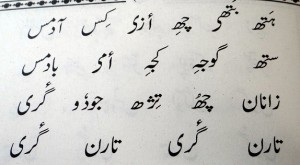 He holds mirror to the society and enables it to see its ugly face, with pox marks, dotted with oozing warts and makes it realize that no from outside has made it look like that.
He holds mirror to the society and enables it to see its ugly face, with pox marks, dotted with oozing warts and makes it realize that no from outside has made it look like that.
Every stanza in this slender collection of 115 pages, moves like surgeon’s scalpel to remove ugly warts on our beautiful skin.
This collection is a great addition to our satirical literature.
With these words I thank you all.
Thanks
Z. G. Muhammad
collection of Zareef Sahib, the first one Khabar Tougma Wanan was published in our times.
iti
This is second poetic collection of Zaree
We have had tradition strong of troubadours – and troubadour-
[i] Bab or Father was a title given to Sheikh Mohammad Abdullah, the first Prime Minister of Jammu & Kashmir.
Filed under: Editor's Take · Tags: Kashmir, Nowhatta, peacewatch, Srinagar
